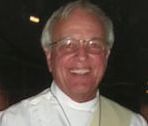We hardly ever hear about hell anymore. I believe hell is the direct opposite of community. Sometimes opposites are the only way to express realities. This definition places the idea of community as the opposite of this idea of hell.
Both – hell and community - are based on the reality that we are created as social beings. It is in our very nature to be social, to be in community. We are created in God’s image and likeness. God’s nature is relational in the Trinity, so we are relational in our lives.
Hell is a condition that happens as a result of putting oneself so consistently ahead of others in one’s life that the capacity for empathy is lost. Empathy, that bridge to others, completely and totally breaks down: no empathy, no connection, no life.
Community was important to Israel in the 7th century BC when the core of the book of Deuteronomy was developed. Israel was an agricultural society then and was slowly emerging into a commercial society by the time of the exile in the 5th century BC when the book was edited and amplified.
Deuteronomy brought together the internalizing of religious commitment, the emphasis on action and attitude, obedience and gratitude, based on love of God. The community through prophets and sages called upon the individual, not just the priests and cultic leaders, to respond to God in obedience arising out of deep heart-searching and self-examination. The teachings contained in this book were a major influence on the New Testament writers in their search to connect Jesus’ life and teachings to the Law and the Prophets.
Jesus’ life was totally one of obedience to his Father, even to dying on the cross. Jesus’ teaching of the first and most important command-ment found in the Gospels of Mark, Matthew and Luke is a quotation from this book.
From Mark Chapter 12: “Listen, Israel, the Lord our God is the one, only Lord, and you must love the Lord your God with all your heart, with all your soul, with all your mind and with all your strength. The second is this: You must love your neighbor as yourself. There is no commandment greater than these.’"
Deuteronomy speaks of the “year of remission,” occurring every seven years. The original legislation was for an agricultural society that all farmland remains uncultivated for a year. The natural cycle of the land as God’s gift would be honored and the earth’s vitality renewed. In the society of tribes and clans, farmland and herds were held in trust within the group.
In the later urban society, commerce and property ownership gave rise to individuals amassing great wealth and acquiring influence and power. There developed a wide separation between the “haves” and the “have nots.” The year of remission was calculated to alleviate conditions of economic poverty by releasing debts incurred by a member of the community. So, within the evolving commercial society, there was concern with protecting the weaker and less fortunate members.
Throughout the Book of Deuteronomy, we hear the voice of compassion for the less fortunate, and respect for all in the community. And we hear that voice today. The Deuteronomist cries out to us, "Open your hand to the poor.”
We can assume with some certainty that Paul studied Deuteronomy; that he was raised in this tradition of compassion for the less fortunate in his community. He organizes a collection to help the Church in Jerusalem. Now, Paul writes to his Corinthians about the collection. He praises the efforts of the Macedonians “in rich generosity” in spite of “severe trials and extreme poverty.” He exhorts the Corinthians with flattery to “excel in this grace of giving, in this generous undertaking.” Just, he tells them, as you excel in faith, in speech, in knowledge, in complete earnestness and in your love for us.” Paul is onto some-thing. Believers give because God has given to them. The first letter of John says, “We love because God first loved us.”
Jesus is our model of compassion for those vulnerable in our community whatever their social status. Mark illustrates this in the story of Jairus’ dying daughter. Just before this scene, Mark tells of the curing of the woman who suffered from hemorrhages for twelve years. She had spent all she had for cures but was getting worse. This woman is at the opposite end of the economic scale to Jairus. He is a leader of the synagogue, responsible for worship, teaching and discipline. He was probably wealthy and influential, used to sending others to do his bidding. Yet, he is as desperate as that woman. The fact that he comes himself instead of sending a servant to ask Jesus to heal his child shows how desperate he is. He throws himself at Jesus’ feet and begs him repeatedly. And just as the healing of the woman with a hemorrhage was so dramatic and immediate, Jesus raises the little girl to life.
Jesus tells the woman that her faith has cured her. He responds to the faith of this desperate father telling him, “Do not fear, only believe.”
The lesson here is that we who receive God’s grace must pass it on, must direct God’s love, overflowing in us, to someone else. This is awesome. Think what it says about us in our daily routine.
It says that every encounter with another person is an opportunity to be a channel of God’s grace, God’s love. Not to think of God’s grace in this way is to regard it as a possession whose only effect is for us as individuals and not for us as a community.
We become like a deep well fed by underground streams of water. The well will continue to be replenished only if water is regularly drawn out. When the water is not drawn from it, the well will eventually dry up from disuse. We are like that well. The water feeding us is God’s grace. If we don’t draw up that grace and pass it on to others, we dry up. We think that God’s grace is just for us alone. We become self-absorbed, eventually disconnected and alone.
No empathy, no connection, no life!
Grace comes into the world finding expression through people. God’s grace becomes what it is meant to be only as it reaches more and more and more people. That can only happen through us – through you and me, as individuals and in community.


 RSS Feed
RSS Feed